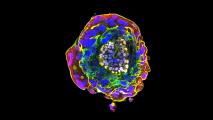Some cancer risk factors are within our control — we can eat healthy, exercise, and avoid tobacco, for example.
But we can’t edit our DNA to undo a genetic predisposition to cancer (not yet, anyway), and we certainly can’t stop ourselves from aging, which is the biggest risk factor both for developing cancer and dying from it.
Researchers already understand some reasons for this — over our lifetime, our body accumulates cancer-causing genetic mutations, while the protections for our DNA get whittled away.
Now, a new study suggests that a naturally occurring byproduct of metabolism called “methylmalonic acid” (MMA) might explain why cancer gets worse as we age — and MMA may be something we can control.
MMA and Cancer Metastasis
Some cancers develop in one part of the body and remain there, but others spread through the body in a process known as “metastasis.”
Cornell University researchers were studying metastasis using lab-grown cancer cells when they discovered that MMA levels increased early in the process.
Past studies had found higher levels of MMA in the blood serum of older people, so the Cornell team decided to explore whether MMA could be the reason cancer spreads more aggressively as we age.
For their new study, published in the journal Nature, they started with 60 samples of cancer cells sourced from lung and breast cancer tumors. They exposed half of the cancers to the blood serum of people 30 or younger, and the other half to serum from people 60 or older.
Over 80% of cancer samples exposed to the older blood serum changed, adopting characteristics of metastatic cancers — compared to only 17% of cancers in the younger serum.
Our hope is that we’ll be able to reduce MMA levels and thereby reduce cancer mortality.
John Blenis
MMA seemed to be the key trigger, too: the outliers in the younger group (which became metastatic) had higher MMA levels, while outliers in the older group (which did not) had lower levels.
The researchers also conducted animal studies and found that the serum from older donors promoted the spread of tumors in mice more than the serum of younger donors. Cancer cells grown in the older serum were also more resistant to two common chemotherapy drugs.
As for why MMA has this effect on cancer cells, it appears to indirectly increase the expression of a gene linked to metastasis.
Controlling MMA Levels
The Cornell study doesn’t imply that higher MMA levels increase a person’s risk of getting cancer — just that it’s more likely to spread throughout the body when they do — so future studies would be needed to explore that possibility.
Still, metastasis is the major reason people die of cancer, and while we can’t stop ourselves from getting older, there might be things we can do to prevent the increased MMA levels that go along with age — though, again, more research is needed to find them.
“This discovery is the beginning of many investigations in many different directions,” researcher John Blenis said in a press release, “but our hope overall is that we’ll be able eventually to develop therapies to reduce MMA levels and thereby reduce cancer mortality.”
We’d love to hear from you! If you have a comment about this article or if you have a tip for a future Freethink story, please email us at tips@freethink.com.






